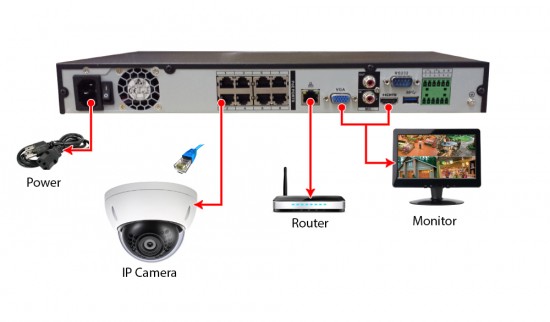
The importance of “bench testing” your security camera equipment can often be overlooked and this can lead to unforeseen delays in the installation process. There are many advantages to bench testing that are often overlooked by many installers and this can make the process of installing the cameras longer and cause unnecessary damage to the equipment. In order to avoid these potential pitfalls we are going to discuss some basic questions you should know that can make this process simple and easy for you to complete yourself. What is bench testing? How do I conduct a bench test? What are things to look for when bench testing? What are the advantages of bench testing? In covering some of these basic questions we can give you an overview that can save you time, money, and any potential heartache that can often result from an incorrect install.
What is Bench Testing?
Bench testing is a common term for testing equipment prior to installation in many fields. Surveillance systems are no exception. It is a process that should be conducted before the installation process to test equipment, configure software, and program presets prior to installation. It allows you to check the cameras for performance. Does the infrared function correctly? Are the correct resolutions being output as desired? Does the camera have any housing defects that may cause leaks or damage? Are the power supplies outputting enough amperage? Are the cable fittings securely and correctly fastened to ensure a proper connection? Is the NVR (Network Video Recorder) or DVR (Digital Video Recorder) outputting any error codes? Bench testing can answer many of these questions so when you conduct the install you can rule out many of the rudimentary problems that might occur when troubleshooting. Bench testing also allows you to test lighting adjustments and the configuration of cameras as well as some potential networking concerns that may pop up during the install such as IP addresses etc. To put it briefly, bench testing is a method to test and pre-configure your surveillance system which give you many advantages prior to installation that will ensure your installation goes smoothly and without issues.
What are the Advantages of Bench Testing?
Bench testing allows for a thorough check of ordered inventory, equipment quality, configurations and settings. In doing this, you allow for time to fix potential defects, configuration conflicts, system settings, etc. in a timely fashion that may not be afforded to you during the install. In addition, our tech support department is available to help you prior to the install and can remotely configure some of these settings if your system is connected to the Internet. This allows you to iron out any unforeseen issues that may have come up during your bench test. It is recommended that you bench test as soon as possible to allow yourself time to troubleshoot any issues before the installation takes place. This will allow you time to readjust fittings on cable, check and test various other parts of the system by switching equipment, or to contact our tech support team for any advanced issues that cannot be resolved with simple adjustments. This also could save you shipping costs on having to order more cable if you needed more than you thought by giving you time so you don’t have to pay for rush shipping.
How Do I Conduct a Bench Test?
The simplest way is to set up the equipment as you would during the installation without actually drilling, screwing, etc. (This will ensure you can return equipment if you find it will not work in the manner you wished by not leaving tool marks etc.) For example, a camera you may have thought would work despite having 2 axis will not give the desired angle can then be switched with one that does etc. Connecting the cameras to the DVR/ NVR and connecting any associated equipment such as power supplies, microphones and cabling etc. will ensure you everything is working correctly. Following this, if you are using an IP system, is ideal to configure the cameras and other equipment to the IP scheme that is your preference as well as customizing the variety of settings available within the different menu systems. This will make your IP system essentially plug and play during the actual installation process. Bench Testing boils down to conducting a pre-installation and should be conducted as thoroughly as possible to allow for a quick and easy install.
What are Things to Look for When Bench Testing?
Well, there are a few different concerns that have not been addressed already above. First is to boot the DVR/ NVR and ensure it boots properly and reveals the correct amount of hard drive space (Note: every drive will show slightly less than what the drive’s total is. The drive has pre-partitioned space dedicated to the drive’s basic performance tasks within itself). Next is testing the cable and making sure both sides function correctly. This is a simple matter of connecting the cameras and equipment using the cable and surveillance equipment you would use during the install. The part that hasn’t been addressed previously is that it is advantageous to pre-cut your lines to the lengths desired to allow you to test all potential connections you would utilize. The next step is checking your IP settings and ensuring they are configured the way you would like them when the install is completed. Finally, a major factor in your bench test should be a cursory check of all equipment for physical defects that may have occurred during shipping and while unlikely a factory defect.
In the end, a bench test is just another method to add to any installation process that will give you the advantage of knowing exactly how and what will need to be set up during your installation with the confidence of knowing that each piece of equipment is working correctly and configured to your convenience. If you’d like to know more about each specific types of installation and How to’s please see the links posted below in Related Posts or contact our tech support team for more details. Of course, if you would like a professional to install and test your equipment you can get advice from our security camera installation department here.
Here is a video I created on a sample bench test
https://youtu.be/-ebHQK769NQ

